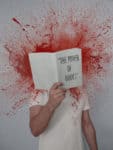Yesterday afternoon the east grew dark, and the first rumble of thunder drove both dogs under my desk. Apparently the safest space in the world is between my ankles–Odd always thought so, Miss B is continuing the tradition and furthermore teaching Sir Boxnoggin its ways.
Which means both my feet had largish doggos resting upon them, and turned into numb bits of meat by the time the sky cleared. It also meant I had to coax both of them outside to pee.
The things we do for love, right?
I should tell you guys about how BattleJay discovered Batgirl’s theft of his ill-gotten peanut gains, but that can wait for a different day. Instead, let’s talk about revision.
I’m currently in the wilds of The Maiden’s Blade, going sentence by sentence, paragraph by paragraph, to make it better. The first draft was okay, and when the edit letter landed it was full of ways to make the entire book better, stronger, faster, deeper. You can’t fix problems you can’t see, and that’s the purpose of edit letters: to show you the holes and the thin-paper bits.
But there’s that spot between the zero draft–when the corpse is finally out of your head, whole and entire, lying on the table–and the first draft, which is the version you can finally let someone else (a writing partner, a long-suffering agent, or an editor) see. I tend to produce really clean first drafts and by the time I get them done I’m sick of the book and can’t see the forest for the trees, so I feel confident enough giving them to my agent. Your mileage may vary, of course, but there comes a time when you can’t chew the piece anymore and have to get it out of your teeth one way or another. Figuring out when that time is takes practice and finishing your pieces, however short, but that’s–say it with me–another blog post.
So, here are some things you can focus on to turn a zero draft into a respectable first.
Set it aside.
This is in many ways the most important step. You’ve finished a zero draft, a large and very intense expenditure of mental, physical, and emotional energy. Give the engine in your head some time to cool off and come down from redline. Give yourself a prize for sticking with it and crossing the finish line, and put the damn thing in a folder or a desk drawer for at least a week. (A short story or poem may take less time to recover from, but don’t bet on it.) The time away is necessary for recovery, a sense of proportion, and whatever sanity those afflicted by the Muse can lay claim to.
Kill “that” and dialogue tags.
When you do go back, there are simple things you can look for to tighten the draft immeasurably. “That” is unnecessary nine times out of ten, it is largely a weasel word and I despise its use. If you can delete it, do. And dialogue tags (he said, she whispered, they moaned) do very little to move the story along. A dialogue tag is almost always a missed opportunity for a descriptive or action tag, and since every sentence ideally must advance the action, show us something about the character, or provide us with information about the world the story inhabits, you do not have time or space for unnecessary “they said”s.
Two out of three ain’t bad.
Yes, ideally every sentence, no matter how small, fulfills all three requirements. But screws fall out, the world is an imperfect place, so on, so forth, so try to aim for getting two out of three as often as possible. This is far easier to do when you have the whole corpse of the story out so you can see the direction events are tending and have a structure already in place to work with.
Look for “crutch” words.
One of the things I’ve grown to like about Scrivener is the project statistics function, where I can look for crutch words–those words I’ve fallen in love with over the course of a story and use with improper abandon. They change with each piece, and only the Muse knows why this happens, but unless you’re deliberately playing with a word for artistic purposes, the repetition will be off-putting for your readers.
Crush passive voice.
This one has been covered extensively. Unless you’re deliberately slowing the pacing down or need passive voice for a defined, conscious reason–for example, to highlight that a character is abdicating responsibility, especially inside their own head–passive voice is weasel voice, and it will only slow you down and bore your reader.
Make conscious choices.
Writing takes different mental muscles than revising. When I’m in the heat of creation, I don’t care if I’m using passive voice or if I’m using a crutch to get along. Anything that gets the story out of my head is permissible. While revising I need to make sure that if I’m breaking rules of grammar, story, etc., I am doing it consciously instead of slapdash. Part of an editor’s function is to challenge a writer’s choices to make sure the imperfect ones are deliberately imperfect, so to speak, but between the zero and first draft the onus is on you-the-writer. You can certainly break the rules, but you need to know them in order to break them effectively, and the transition to zero to first is the best place to begin questioning every choice and making sure it’s the one you want.
Notice I don’t say the “right” choice; I say “the one you want.”
Say it out loud.
If it’s dialogue, does it honestly sound like something that particular character would say? Reading aloud is also good for combat or sex scenes (if you can overcome blushes at the latter) because it will show you where the pacing is off. Controlling how fast the reader moves through a paragraph during a combat or sex scene, where you want the rising tension and the payoff in specific places, is hard. Noticing where the natural breath-stops are in dialogue and in action will help you nudge the reader further into caring about what’s going on by making them hold their breath through a long sentence or chopping things up into short bits to achieve a strobe effect. Punctuation isn’t just a necessary evil, it’s a means of helping your reader extract the most from your story on a very basic level. Plus, if you have to do a reading, you’ll thank yourself for the practice.
This is by no means an exhaustive list, but squeaky toys can only keep the dogs occupied for so long and I’ve got to get them out the door for a run before their fidgets drive both me and them crazy. The space between zero and first is fraught, but it’s also a chance to get the worst unconscious mistakes out of the way so the conscious ones aren’t lost and so your work has a shot of impressing someone who’ll pay you cash for it.
Because even writers have to eat, you know. Let alone a writer’s children, or their wonderful, maddening, energetic dogs.
Over and out.






